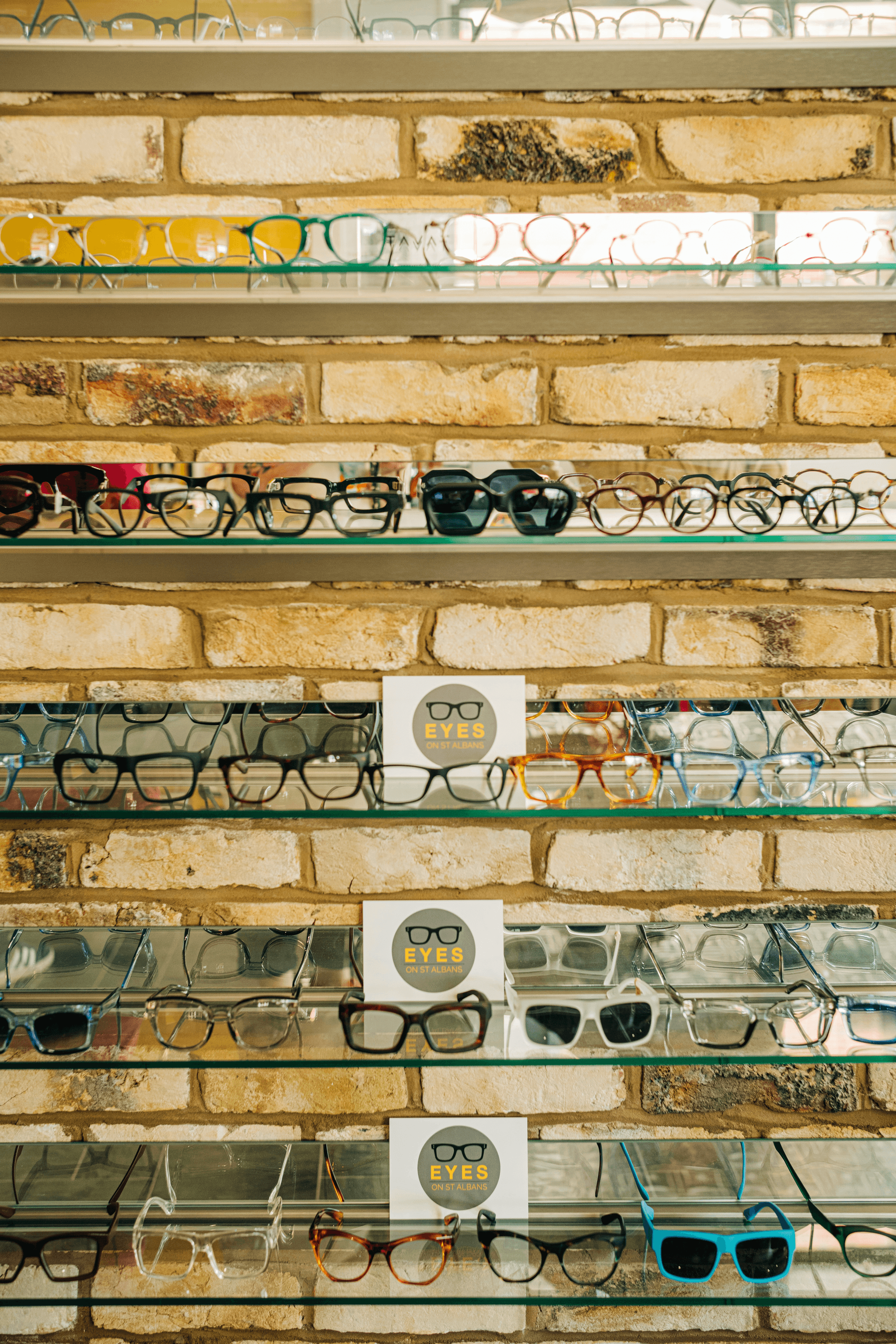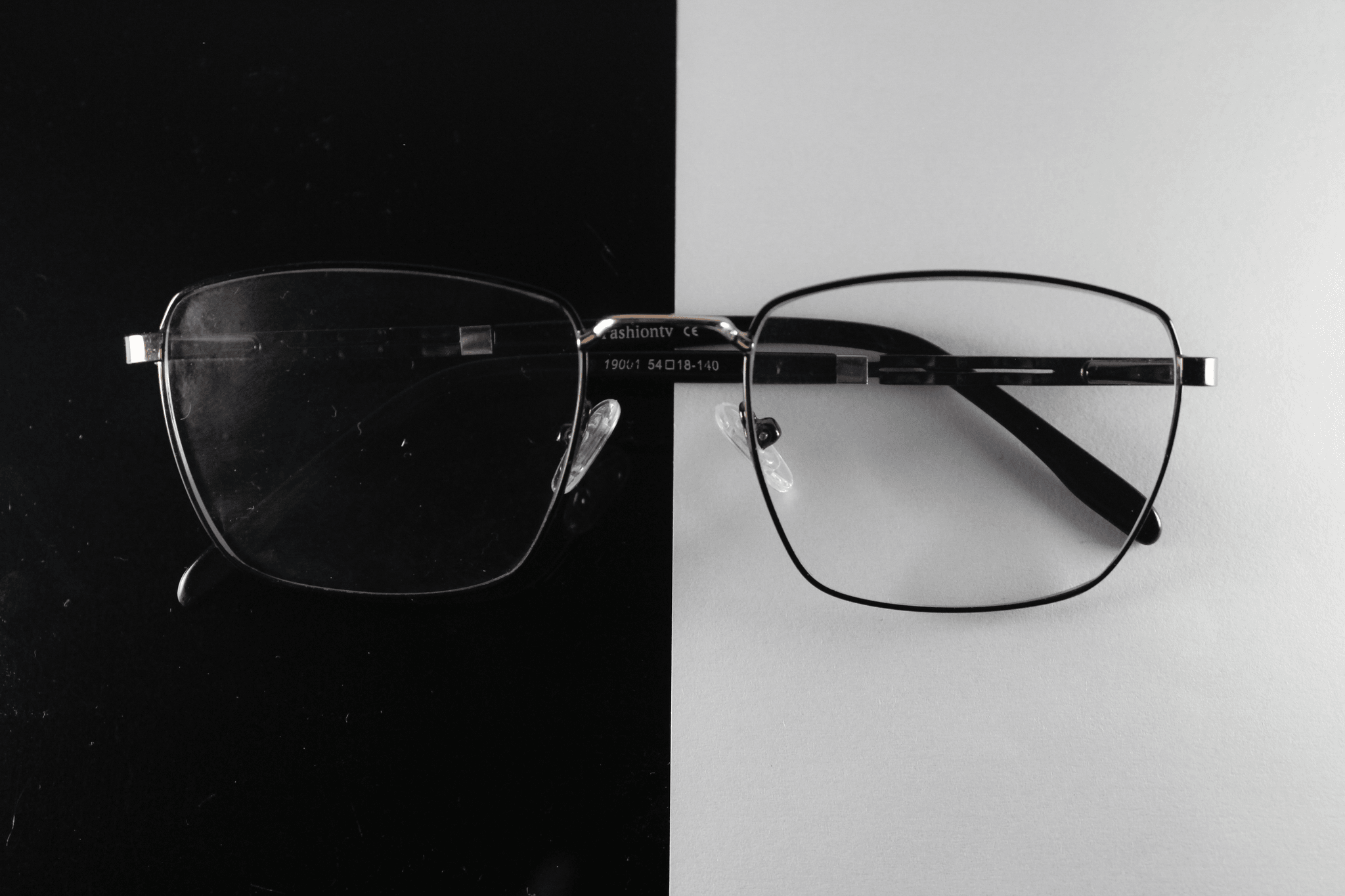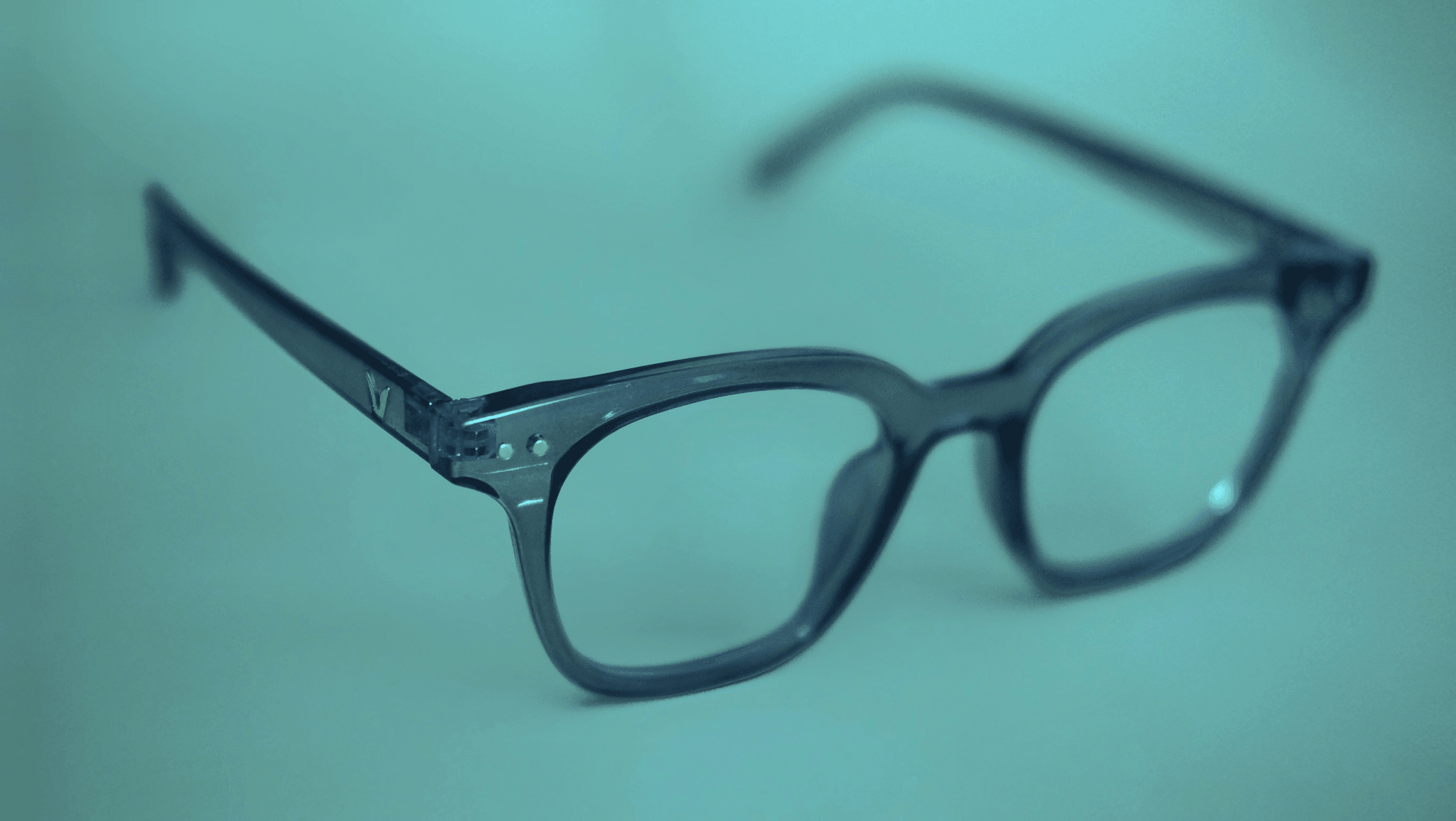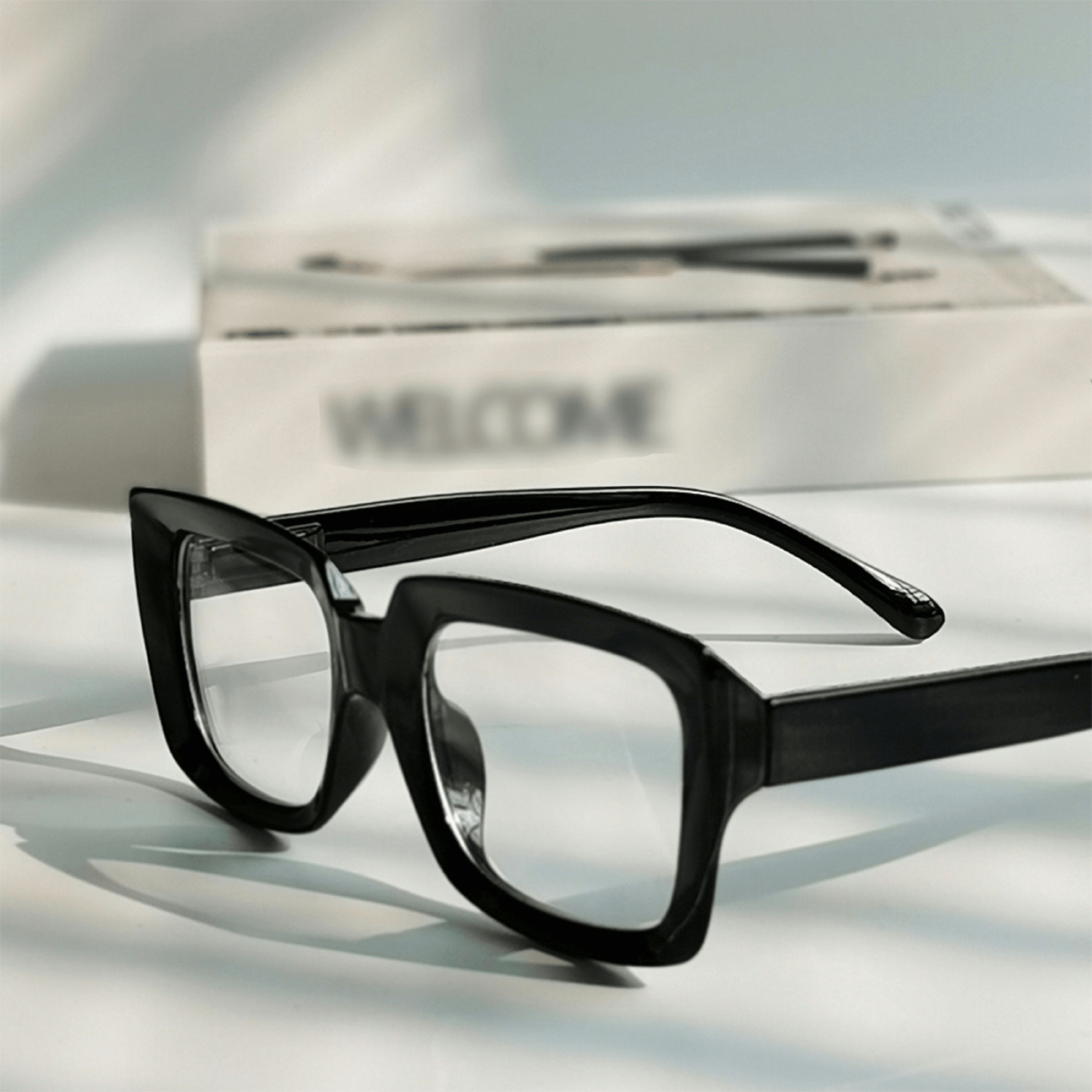Introduction

Selecting the right eyewear can feel like navigating a maze, especially when faced with the choice between acetate and metal eyewear. Each material boasts its own unique characteristics, making the decision more than just a matter of style; it’s about finding what fits your lifestyle best. In this guide, we’ll explore the aesthetic appeal of different frames and how comfort plays a crucial role in your selection.
Understanding Acetate and Metal Eyewear
Acetate and metal eyewear represent two distinct worlds in the realm of glasses, each with its own set of advantages and drawbacks. Acetate frames are made from a plant-based plastic that offers vibrant colors and patterns, while metal frames are typically crafted from materials like stainless steel or titanium for durability. When considering “Are acetate or metal glasses better?”, it ultimately boils down to personal preference, as both materials cater to different needs.
The Aesthetic Appeal of Different Frames
The visual charm of acetate versus metal frames is undeniable; acetate often shines with bold designs that appeal to fashion enthusiasts looking for statement pieces. On the other hand, metal frames deliver a timeless elegance that can enhance any outfit without overwhelming it. Whether you prefer the playful aesthetics of acetate or the sleek sophistication of metal, understanding these styles helps you make an informed choice.
Comfort: Choosing the Right Material for You
Comfort is paramount when selecting eyewear; after all, those stylish frames need to sit well on your face! Acetate tends to be lighter than many metal options but may lack some adjustability—leading us to ponder: What are the disadvantages of acetate glasses? Conversely, metal frames offer adjustability for a personalized fit but can sometimes be heavier on the nose. It’s essential to weigh comfort alongside aesthetics when determining whether “Is acetate good for eyeglasses?” suits your needs best.
Acetate vs. Metal Frames Overview

The Material Breakdown of Acetate Eyewear
Acetate is a plant-based plastic derived from cellulose, which gives it a lightweight yet sturdy quality that many people appreciate in their eyewear. One of the standout features of acetate is its versatility in colors and patterns; it's available in an array of vibrant hues that can make your glasses a fashion statement. However, while acetate offers aesthetic appeal, some might wonder: Is acetate good for eyeglasses? The answer largely depends on individual needs—while they are stylish and comfortable for many, they may not be as durable as metal options when subjected to rough handling.
The Strength and Durability of Metal Frames
On the other hand, metal frames are often celebrated for their strength and durability, making them a popular choice among those who prioritize longevity in their eyewear. Typically made from materials like stainless steel or titanium, these frames can withstand more wear and tear compared to their acetate counterparts. If you're asking yourself: Are acetate or metal glasses better? Consider your lifestyle; if you lead an active life or frequently misplace your glasses, metal frames might be the more reliable option.
Price Comparison: Acetate vs. Metal
When it comes to pricing, there's often a noticeable difference between acetate and metal frames. Generally speaking, acetates tend to be more affordable due to lower production costs; however, high-end designer acetates can sometimes rival the price tags on premium metal eyewear. Ultimately, whether you lean towards Acetate vs. Metal Frames or even Acetate vs. Metal Frames in Sunglasses, it's crucial to weigh both your budget and personal style preferences before making a purchase decision.
Style and Design Choices

Trendy Acetate Styles for Fashion Lovers
Acetate frames have surged in popularity among fashion enthusiasts for their vibrant colors and unique patterns. From oversized cat-eye silhouettes to bold geometric shapes, trendy acetate styles allow wearers to express their personality effortlessly. Are acetate or metal glasses better? For those who prioritize fashion-forward looks, acetate often takes the crown with its limitless design possibilities.
One of the main advantages of acetate is its ability to showcase intricate designs that are both eye-catching and lightweight. However, it's essential to consider what are the disadvantages of acetate glasses—such as potential brittleness over time if not cared for properly. Overall, if you're looking to make a stylish statement while maintaining comfort, trendy acetate eyewear could be your best bet!
Classic Metal Frame Looks
On the other end of the spectrum lies classic metal frame looks that exude sophistication and elegance. Metal frames offer a sleek aesthetic that never goes out of style; think wire-rimmed aviators or round spectacles reminiscent of vintage charm. Many people wonder whether metal frames can compete with their colorful counterparts when asking: Is acetate good for eyeglasses? While both materials have their merits, metal frames often shine in terms of durability.
Metal eyewear tends to be more adjustable than acetate options, allowing for a customized fit that can enhance overall comfort throughout the day. Additionally, they tend to hold up better under pressure—making them ideal for those who lead an active lifestyle or require reliable everyday wear. When weighing Acetate vs. Metal Frames in sunglasses or regular spectacles, consider how each material aligns with your personal style preferences.
Customization Options in Acetate and Metal
Customization has become increasingly popular among eyewear brands looking to cater to individual tastes and preferences—Daposi is no exception! Whether you lean towards chic acetates or refined metals, there’s ample opportunity to create something uniquely yours through bespoke designs or personalized engravings on frames. This flexibility allows wearers not only to choose colors but also shapes that complement their facial features perfectly.
When deciding between acetate vs. metal frames regarding customization capabilities, it’s worth noting that both materials offer unique advantages tailored toward different aesthetics and lifestyles alike! With Daposi's commitment to quality eyewear along with innovative production techniques—bringing your vision into reality has never been easier! So why not explore all available options before settling on your next pair?
Comfort and Fit

Weight Considerations: Which is Lighter?
Weight plays a crucial role in comfort when wearing glasses for extended periods. Generally, acetate frames tend to be lighter than their metal counterparts, making them a popular choice for those who prioritize comfort. However, advancements in metal frame design have led to the creation of ultra-lightweight options that rival acetate in terms of wearability.
If you're wondering whether acetate or metal glasses are better regarding weight, it ultimately depends on personal preference and specific designs available on the market. Some individuals may prefer the lightweight feel of acetate frames, while others might appreciate the sturdiness that comes with metal options. It's essential to try both styles to see which feels more comfortable on your face.
Adjustability of Metal Frames
One significant advantage of metal frames is their adjustability. Unlike acetate eyewear, which is rigid once manufactured, metal frames can be easily adjusted by an optician for a perfect fit around your nose and ears. This flexibility can be particularly beneficial if you have unique facial features or require specific adjustments for optimal comfort.
The ability to customize fit makes metal frames a popular choice among those who seek tailored eyewear solutions—especially if you're considering Daposi's commitment to quality eyewear that aligns with individual preferences! Whether you’re adjusting for improved stability or just looking for that sweet spot where comfort meets style, metal frames offer versatility that many find appealing.
How to Tell if Glasses are Acetate or Plastic
Identifying whether your glasses are made from acetate or plastic can be quite straightforward when you know what signs to look for. First off, acetate typically has a more luxurious finish with vibrant colors and patterns compared to standard plastic materials that often appear duller and less refined. If you're curious about how to tell if glasses are acetate or plastic? Check for any markings inside the temple; genuine acetate usually has AC stamped somewhere as an indication of its material composition.
Another tip is examining the weight—acetate tends to feel heavier than typical plastic options due to its density but remains lighter than most metals used in eyewear construction. With so many choices available today—including both acetate vs. metal frames in sunglasses—being able to distinguish between these materials ensures you choose what best fits your lifestyle needs!
Maintenance and Care

Cleaning Tips for Acetate Eyewear
Acetate glasses are known for their vibrant colors and patterns, but they also require gentle care to maintain their beauty. To clean acetate eyewear, start by rinsing them under lukewarm water to remove surface dirt. Use a mild soap or a dedicated eyeglass cleaner with a soft microfiber cloth; avoid using paper towels or rough fabrics as they can scratch the lenses.
It's important to dry your acetate glasses thoroughly after washing, as moisture can weaken the material over time. Regularly check for any signs of wear or damage, such as loose hinges or scratches on the lenses—these issues can often be fixed easily if caught early! Remember, while acetate is stylish and lightweight, you might wonder: What are the disadvantages of acetate glasses? The answer lies in their susceptibility to heat and chemicals; always store them away from extreme temperatures.
Care Instructions for Metal Frames
Metal frames have their own set of care instructions that help maintain their strength and aesthetic appeal. Begin by wiping down metal eyewear with a soft cloth daily to prevent buildup from oils or dust that can dull their shine. For deeper cleaning, use warm water mixed with mild soap—just like with acetate frames—and ensure you dry them completely afterward.
One significant advantage of metal frames is their adjustability; however, be cautious when bending them back into shape as excessive force may lead to breakage. Regularly check screws and hinges on metal frames since they might loosen over time; tightening them can prevent further damage down the line!
Is Acetate Good for Eyeglasses?
Many people ask, Is acetate good for eyeglasses? The answer is a resounding yes! Acetate offers several benefits: it's lightweight, hypoallergenic, and available in an array of colors that make any pair stand out—perfect for fashion lovers seeking unique styles! However, remember that while this material shines in aesthetics and comfort, it does have its limitations regarding durability compared to metal.
In conclusion, whether you're drawn towards stylish acetate or sturdy metal eyewear largely depends on personal preference combined with lifestyle needs. By following proper maintenance routines tailored specifically for each material type—like those outlined above—you'll ensure your favorite pairs remain in top-notch condition! At Daposi we believe in bringing your vision to life through quality craftsmanship; our commitment extends beyond just selling eyewear—we're here every step of the way!
Advantages and Disadvantages

What Are the Disadvantages of Acetate Glasses?
While acetate glasses are celebrated for their vibrant colors and stylish designs, they do come with some drawbacks. One significant disadvantage is their susceptibility to warping or bending under extreme heat; leaving them in a hot car could lead to an unfortunate fashion faux pas. Additionally, individuals who wear glasses full-time may find that acetate frames can become heavier over extended periods, causing discomfort—a factor worth considering if you're pondering whether Is acetate good for eyeglasses?
Furthermore, while cleaning is relatively straightforward, acetate can scratch more easily than metal frames. This means that if you’re prone to clumsiness or have an active lifestyle, you might want to think twice about opting solely for acetate eyewear. Lastly, when comparing Acetate vs. Metal Frames in sunglasses, remember that metal options often provide a sleeker profile which some may prefer over the bulkier appearance of certain acetate styles.
Benefits of Choosing Metal Frames
Metal frames boast several advantages that make them appealing for many eyewear enthusiasts. First off, they tend to be more durable than their acetate counterparts; this durability makes them less prone to breakage from everyday wear and tear—ideal for those who lead a more active lifestyle! Plus, metal frames often feature adjustable nose pads which allow for a customized fit—an essential aspect when considering comfort.
Another benefit is the lightweight nature of many metal frames; they can feel almost weightless on your face compared to heavier acetate options. This quality makes them particularly attractive for long-term wearers who prioritize comfort alongside style. Additionally, with various finishes available—from shiny chrome to matte black—metal eyewear provides endless opportunities for personal expression while maintaining a classic look.
Are Acetate or Metal Glasses Better?
Deciding whether Are acetate or metal glasses better? ultimately depends on your personal preferences and lifestyle needs. If you're someone who values aesthetics above all else and enjoys experimenting with bold colors and patterns, then acetate might be your go-to choice despite its disadvantages like potential heaviness or susceptibility to heat damage. On the other hand, if durability and adjustability are high on your priority list—or if you simply prefer a sleek design—metal frames may serve you better in both style and functionality.
In conclusion, both materials have distinct pros and cons worth weighing carefully before making your choice in eyewear fashion! By understanding what each has to offer—and how they align with your specific requirements—you'll be well-equipped to select the perfect pair that enhances not just your vision but also your unique style! Remember at Daposi: Bringing Your Vision to Life means finding what works best for YOU!
Conclusion

In the world of eyewear, choosing between acetate and metal frames can feel like navigating a stylish maze. Both materials offer unique advantages and cater to different tastes and needs, making the decision process all the more intriguing. Ultimately, understanding your own preferences—be it aesthetics, comfort, or functionality—will lead you to the perfect pair.
Final Thoughts on Frame Selection
When it comes down to it, the question Are acetate or metal glasses better? doesn't have a one-size-fits-all answer. Each frame type brings its own flair; acetate offers vibrant colors and patterns while metal provides a sleek and timeless look. Consider your lifestyle and how each material aligns with your daily needs before making that final selection.
Choosing the Best Material for Your Lifestyle
Choosing between acetate vs. metal frames can significantly impact not just your style but also your comfort throughout the day. If you're someone who values lightweight materials that come in an array of colors, you might find that acetate is good for eyeglasses in terms of both aesthetics and wearability. On the other hand, if durability and adjustability are high on your priority list, metal frames may be more suitable for your active lifestyle.
Daposi’s Commitment to Quality Eyewear
At Daposi, we believe in bringing your vision to life through exceptional eyewear that meets every individual's unique style demands! Our commitment extends beyond just providing options; we ensure quality craftsmanship whether you choose acetate or metal eyewear. With our focus on customization and sustainability, we're dedicated to helping you find eyewear that not only looks great but also aligns with your values.
